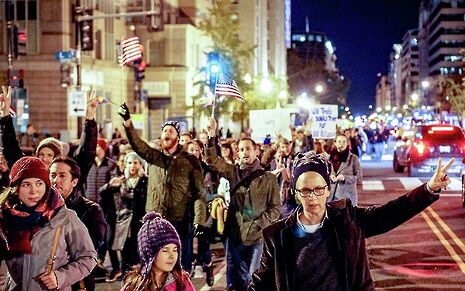Politics without emotion is a privilege
It’s only natural that people want to retreat from discussions where their identity and right to exist is questioned, argues Yukiko Lui

It feels like we live in a more partisan society than ever before. The ideological gulfs between left and right, women and men, races, genders, sexualities, ability, and classes seem to have grown so large that even the most basic courtesies are forgotten between party lines.
Politics has become a battleground not only for policy but for identity as well. Identity, intensely personal and emotionally fraught as it is, has made discussions of politics much more personal. Many have lamented the death of an era where people were supposedly able to converse with someone who happened to have differing political views without the conversation descending into belligerence. But that viewpoint is one borne, at least to some extent, from privilege.
“The idea of being safe around those who share the view of the world as you is nothing new, and nothing bad”
One of the things that is often offered up as a reason for increased partisanship and ‘PC sensitivity’ is the supposedly blinkered worldview being on the internet can generate. It’s argued that we can now aggressively curate the content we consume online. The pages we like on Facebook, the Twitter accounts we follow, and the YouTube channels we subscribe to can all give the impression of a diversity of opinion while actually reinforcing a specific worldview. But this ignores the fact that the ideological bubbles forming around certain spaces afford us a brief respite from the potential traumas of other media.
In the freedom and security being in friendly territory certain spaces can afford us, it can be easy to forget what the world is actually like – warts and all. However, the idea of being safe around those who share the view of the world as you is nothing new, and nothing bad. The affirmation, validation, and support offered to us in is of immeasurable importance. The only time the existence of these semi-closed, affirming spaces is attacked is by those who want to be granted entry into them only to berate and insult their members. This line of argument completely misses the point. If the existence of online spaces like Black or Asian Twitter or the ability to curate the content we read for our own well-being makes you feel ostracised, then you have a glimpse of what it feels like to live in the mainstream as a marginalised person. Outrage over online ‘bubbles’ like this is better channelled into the creation of a media which does not outcast or degrade the marginalised and render such ‘bubbles’ obsolete.
Mainstream media has, for so long, been dominated by one worldview – I’ll leave you to guess which. The stories we have been told have not been representative at all of the fullness of real diversity. But different identities have existed for ages. They are only now being reported, shared, and tweeted.
To wish for a time when the world wasn’t always tearing at each other’s throats over politics is to ignore the oppression and struggles on which the mainstream has for a long time neglected to shine its spotlight. As politics enters further into the realm of identity and attempts to police, make illegal, or marginalise the core beliefs of a particular groups of people, the intense emotional reaction felt is entirely natural. Laws that criminalise homosexuality constitute an outright attack on someone’s humanity and dignity.
A blow like that cannot be neutralised with the dismissive refrain of ‘it’s just politics’. Even more than that, as we collectively become more aware of different identities, some of us have become (rightly) less willing to accept such attacks on our identities in both public and private fora. We aren’t entering an age of over-sensitivity, we’re entering one of conscientiousness. Those whose identities are not under attack from politics, and whose identities might even be affirmed by it, are often unable to fully understand exactly what is at stake in the game.
This doesn’t mean that if your identities are affirmed by mainstream politics you can’t engage in political discussion or action. It just requires a recognition of how the consequences of politics on people who aren’t white, male, middle-class, cisgender, able-bodied or straight are sometimes more severe than for those who are.
 Features / Should I stay or should I go? Cambridge students and alumni reflect on how their memories stay with them15 December 2025
Features / Should I stay or should I go? Cambridge students and alumni reflect on how their memories stay with them15 December 2025 News / Dons warn PM about Vet School closure16 December 2025
News / Dons warn PM about Vet School closure16 December 2025 News / Cambridge study finds students learn better with notes than AI13 December 2025
News / Cambridge study finds students learn better with notes than AI13 December 2025 News / News In Brief: Michaelmas marriages, monogamous mammals, and messaging manipulation15 December 2025
News / News In Brief: Michaelmas marriages, monogamous mammals, and messaging manipulation15 December 2025 Comment / The magic of an eight-week term15 December 2025
Comment / The magic of an eight-week term15 December 2025









